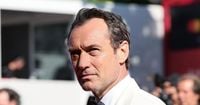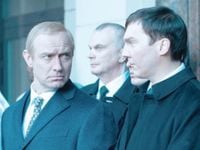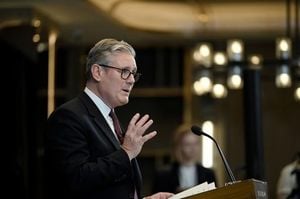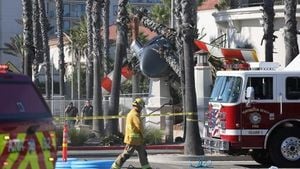The Venice Film Festival has always been a stage for cinematic daring, but few premieres have sparked as much intrigue and debate as the unveiling of The Wizard of the Kremlin. On September 1, 2025, the world watched as Jude Law, transformed almost unrecognizably, stepped onto the red carpet in a white tuxedo, ready to face both applause and scrutiny for his portrayal of Russian President Vladimir Putin. The film, directed by French auteur Olivier Assayas and adapted from Giuliano da Empoli’s bestselling novel, dives deep into the murky waters of power, manipulation, and modern politics.
Law’s performance—and the film itself—have been the talk of the festival, not just for the actor’s striking physical transformation, but for the boldness of its subject matter. According to France24, Law’s obsessive study of Putin’s mannerisms, combined with subtle prosthetics and what he called “a great wig,” helped him embody the enigmatic leader. “The tricky side was that the public face [of Putin] that we see gives very little away ... I felt that conflict of trying to show very little, but feel an awful lot and portray an awful lot from within,” Law told reporters, as noted by The Guardian.
But the film’s resonance goes far beyond the technicalities of performance. The Wizard of the Kremlin unfolds against the backdrop of the early 1990s, as the Soviet Union crumbled and a new Russian order began to take shape. At its center is Vadim Baranov, a fictional Kremlin spin doctor played by Paul Dano. Baranov’s character, inspired by real-life strategist Vladislav Surkov, is depicted as a master manipulator—an architect behind Putin’s rise to absolute power, and a man whose own values are gradually consumed by the demands of the Kremlin.
“The wizard is the person who is in the background, so there’s a casting of a spell that is happening,” Dano explained at a press conference, as reported by AP. His character’s journey from artist to television producer to political fixer is as much a meditation on personal compromise as it is on the machinery of state power. Dano was adamant that reducing Baranov to a simple villain would be a “massive oversimplification, which does more harm than good.”
The film’s narrative arc traces Putin’s calculated ascent, showing how, through manipulation and strategy, he built a system that rules by fear and total control. As Far Out Magazine described, the story is not just about one man’s rise, but about the broader transformation of Russian politics—one that echoes in the world today. Director Olivier Assayas, best known for works like Carlos and Personal Shopper, emphasized at the festival that the film is “not so much a political film as it is a film about politics—and the perversity of its methods, which now hold us all hostage.”
The timing of the film’s release has not gone unnoticed, especially as Russia’s war in Ukraine enters its third year. Some critics questioned whether the film’s depiction of Putin was appropriate in the current climate. Assayas responded, “What’s going on right now is not only terrifying, but it’s even more terrifying by the fact that we haven’t really found the answer.” Giuliano da Empoli, the author of the source novel, noted that while the book was written before the full-scale invasion of Ukraine, its themes remain “still relevant today, three years later, under different circumstances.”
Despite the controversy, the film’s premiere was met with overwhelming enthusiasm. As The Tribune and France24 reported, The Wizard of the Kremlin received a 10-minute standing ovation at Venice. Law, Dano, and Assayas were visibly moved, with Alicia Vikander—who plays Baranov’s on-again-off-again girlfriend, Ksenia—wiping away tears as the applause continued. The ovation was not just for the performances, but for the film’s willingness to confront difficult questions about power, morality, and the nature of truth in contemporary politics.
Vikander’s role, while supporting, was described by Assayas as embodying “freedom” and providing a moral counterweight to the male-dominated world of Kremlin intrigue. “This is a story about a lot of men talking in rooms,” Vikander observed, but her character, Ksenia, brings a different perspective—one that challenges the cynicism and deception swirling at the heart of the story.
Production on the film was itself a logistical feat. Unable to shoot in Russia, the team relocated to Latvia, recreating the Kremlin’s shadowy corridors and the post-Soviet chaos of the 1990s. The international cast, including Tom Sturridge and Jeffrey Wright, rounded out a story that, while rooted in Russian history, aims to speak to a global audience. Wright, who plays the journalist chronicling Baranov’s story, made an impassioned plea for the film’s relevance: “If [the American idea of aspiring toward utopian perfectibility] is lost, as it is now, then we become what we see in this film.”
For Jude Law, the challenge was not just physical transformation, but navigating the moral ambiguities of playing a leader as polarizing as Putin. “I hope not naively, but ... I didn’t fear repercussions,” he said, echoing sentiments shared with ANI and The Tribune. “I felt confident, in the hands of Olivier and the script, that this story was going to be told intelligently and with nuance and consideration. We weren’t looking for controversy for controversy’s sake. It’s a character in a broader story. We weren’t trying to define anything about anyone.”
Assayas, reflecting on the film’s broader message, commented, “We made a movie about what politics has become and the very scary and dangerous situation we all feel we are in.” That sense of unease—about the smoke screens, the manipulation, and the toxic nature of modern power—permeates every frame of The Wizard of the Kremlin.
As the Venice Film Festival heads toward its closing weekend, with The Wizard of the Kremlin competing for top honors, the film’s impact is already being felt. It’s a reminder that cinema can still provoke, unsettle, and force us to confront uncomfortable truths. Whether or not it takes home the Golden Lion, Assayas’s latest work has cast its own spell—one that lingers long after the credits roll.





